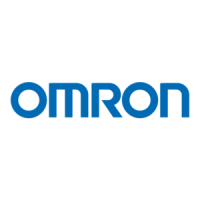2. Terms and Definitions
Explanation and Definition
PDO Communications
(Communications using
Process Data Objects)
This method is used for cyclic data exchange between the
master unit and the slave units.
PDO data (i.e., I/O data that is mapped to PDOs) that is
allocated in advance is refreshed periodically each EtherCAT
process data communications cycle (i.e., the period of primary
periodic task).
The NJ-series Machine Automation Controller uses the PDO
Communications for commands to refresh I/O data in a fixed
control period, including I/O data for EtherCAT Slave Units, and
the position control data for the Servomotors.
It is accessed from the NJ-series Machine Automation
Controller in the following ways.
・With device variables for EtherCAT slave I/O
・With Axis Variables for Servo Drive and encoder input slave to
which assigned as an axis
SDO Communications
(Communications using
Service Data Objects)
This method is used to read and write the specified slave unit
data from the master unit when required.
The NJ-series Machine Automation Controller uses SDO
Communications for commands to read and write data, such as
for parameter transfers, at specified times.
The NJ-series Machine Automation Controller can read/write
the specified slave data (parameters and error information, etc.)
with the EC_CoESDORead (Read CoE SDO) instruction or the
EC_CoESDOWrite (Write CoE SDO) instruction.
There are various types of slaves such as Servo Drives that
handle position data and I/O terminals that handle the bit
signals.
The slave unit receives output data sent from the master, and
sends input data to the master.
A node address is an address to identify a unit connected to
EtherCAT.
ESI file
(EtherCAT Slave
Information file)
The ESI files contain information unique to the EtherCAT slaves
in XML format.
Installing an ESI file enables the Sysmac Studio to allocate
slave process data and make other settings.

